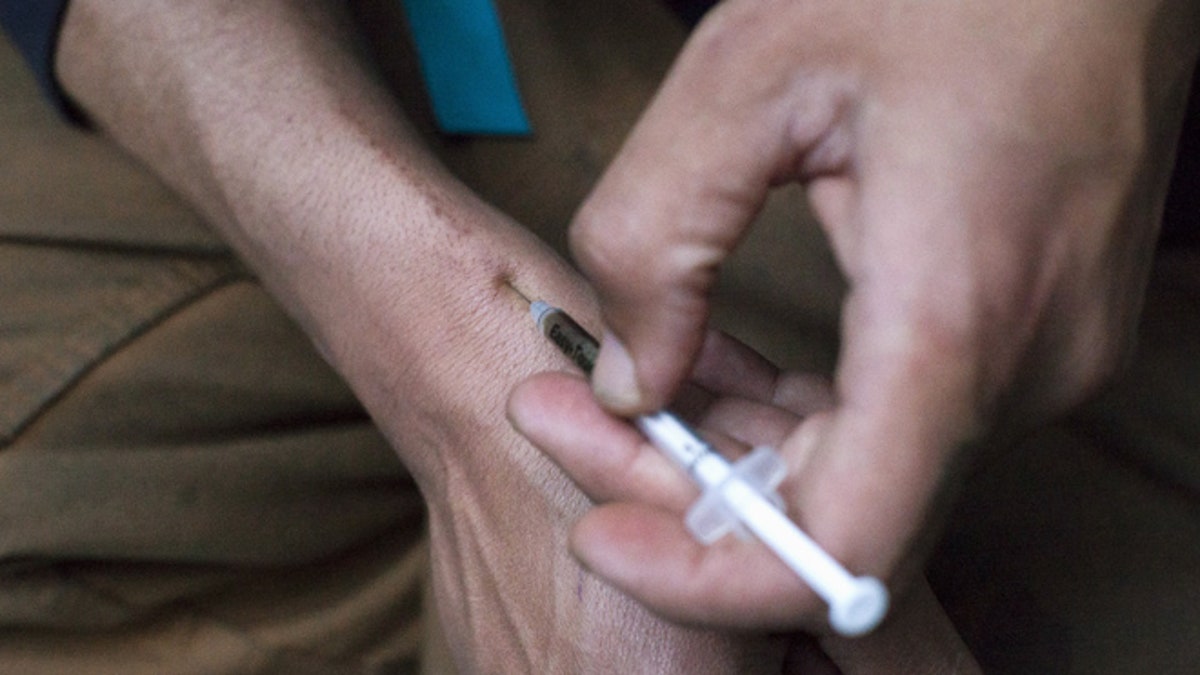
May 14, 2015: A man injects himself with heroin using a needle. (Reuters)
In addition to pencils, books and computers, count a new tool this year at many schools around the country: the heroin-overdose antidote naloxone.
Many schools now keep naloxone on hand, and some states allow or encourage schools to stock it. Rhode Island now requires it for all middle, junior high and high schools.
Naloxone, also known by the brand name Narcan, may never be needed in an individual school, say nurses, officials and health workers, but it can save a life if a child, parent or school employee overdoses on heroin or prescription painkillers.
Kathleen Gage, a nurse at Pilgrim High School in Warwick, Rhode Island, bought Narcan on her own after attending a lecture and training last fall about naloxone. She pushed for the law to require it, and even brought it into her 11th-grade health classroom, teaching students how to use it and get it at a pharmacy.
"They were really enthusiastic that this could reverse an overdose, and they would have the tool to do it," she said.
The National Association of School Nurses is pushing all schools to keep the antidote on hand.
"We're facing an epidemic," said Beth Mattey, president of the group. "People are dying from drug overdoses, opioid drug overdoses. We need to be able to address the emergency."
Heroin overdose deaths in the United States nearly quintupled from 2001 to 2013, according to the Centers for Disease Control and Prevention. It says 71 percent of overdose deaths relating to prescription drugs in 2013 involved opioid painkillers - drugs including heroin, oxycodone, codeine, fentanyl and morphine.
Naloxone can reverse the effects of an overdose on opioids. Administered via syringe or a nasal spray, naloxone works almost immediately to get an overdose patient breathing normally again, and does not create a high or have major side effects.
Overdoses at school are rare but not unheard of.
A survey of 81 Rhode Island school nurses who participated in a naloxone training program last year found that 43 percent of high school nurses who responded reported that students in their schools were abusing opioids, according to statistics released by the state health department. Fifteen said they had to call 911 at least once in the past three years for suspected student substance use or overdose.
From July 2014 to August 2015, 29 children ages 17 and younger were administered Narcan in Rhode Island, according to the health department. During that time, naloxone was administered once at a school, although it was later determined the person had not overdosed.
One of the children given Narcan was just 4 years old. The details of that case aren't clear, but some nurses said they worried about an overdose by a curious child with access to a relative's drugs.
Rebecca King said she has seen incidents of substance use as a nurse in a K-8 school in Delaware. Seeing a child collapsed on the floor is the "worst nightmare" of every school nurse, she said.
"Naloxone saves lives," King said. "It can really be the first step toward recovery."
Some districts have struggled with the decision. School officials in Hartford, Vermont, last year decided not to stock naloxone because of liability concerns and worries that those administered the drug could become combative when awakened. But they changed their minds last month, with school board members citing the low cost of Narcan and problems with drug abuse in the region.
Those who have experience with the drug stress that naloxone is safe, even if given to someone who isn't overdosing.
People coming to are often groggy and confused and may experience withdrawal, but they typically don't become violent, said Laura Byrne, executive director of the HIV/HCV Resource Center in Lebanon, New Hampshire. She has given out doses of Narcan to some school nurses who asked for it.
To allay concerns that school employees could be sued for giving a life-saving drug, the Rhode Island law says no one can be held liable for using it or be disciplined for refusing training.
Laws in Kentucky and New York explicitly allow school employees to obtain and administer naloxone and excuse them from liability for using it in an emergency.
Delaware passed a resolution this year endorsing expanded access to naloxone in schools. Since then, its 40 high schools have received donated auto-injector kits, King said.
Under Rhode Island's new law, around 115 schools will have to carry naloxone. Nurses will be trained in October. At $25 to $40 per dose, the total cost will be a few thousand dollars.
In Massachusetts, nurses in more than 200 school districts have been trained to use it. The middle school and high school in Easton, a Boston suburb, now have naloxone in the nurse's office, Superintendent Andrew Keough said.
He said he has heard no complaints from parents and likens it to keeping on hand a heart defibrillator or EpiPen, used to treat severe allergic reactions.
"It's to be used in the case of an emergency," Keough said. "We haven't had an emergency like this, but if we did, we know that seconds really count."

